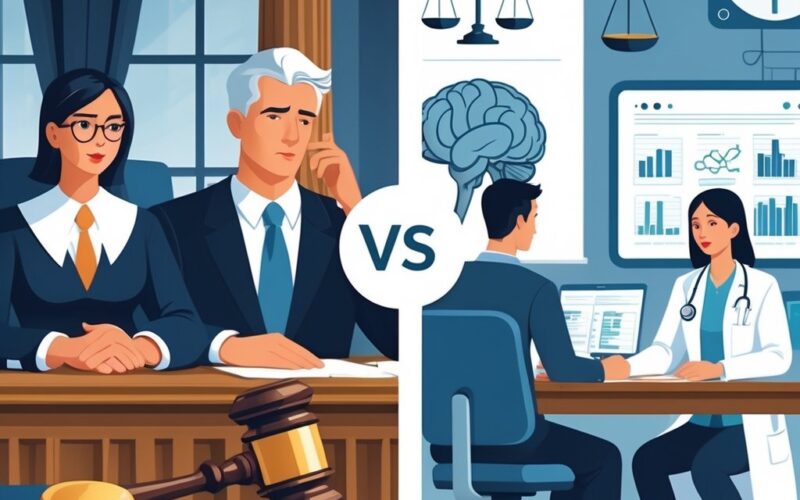When you hear the term “insanity” in legal or medical contexts, it might sound like they mean the same thing. But these concepts serve very different purposes and follow their own criteria.
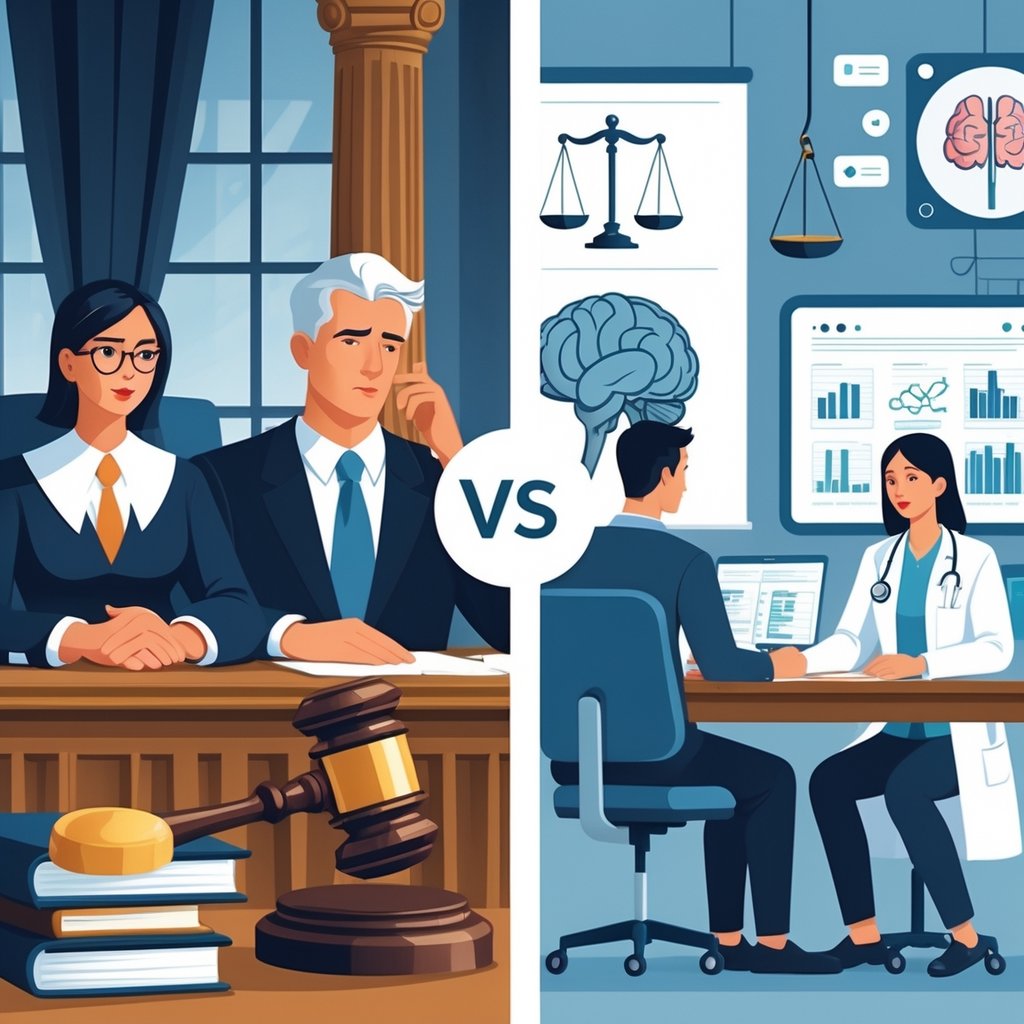
Medical insanity refers to any mental health condition diagnosed by healthcare professionals. Legal insanity is a specific legal determination that someone can’t be held criminally responsible for their actions due to severe mental impairment.
This difference matters because a person can be medically insane but still legally responsible for their crimes.
When someone with a mental illness commits a crime, the distinction becomes critical. Your medical diagnosis alone won’t protect you from criminal charges.
The legal system wants proof that your mental state stopped you from understanding right from wrong or controlling your actions at the time of the offense.
Key Takeaways
- Medical insanity is a psychiatric diagnosis. Legal insanity is a courtroom defense that requires proving lack of criminal responsibility.
- You can have a mental illness and still be legally accountable if you understood your actions were wrong.
- The burden of proof for legal insanity lands on the accused person to show their mental incapacity at the time of the crime.
Defining Legal and Medical Insanity
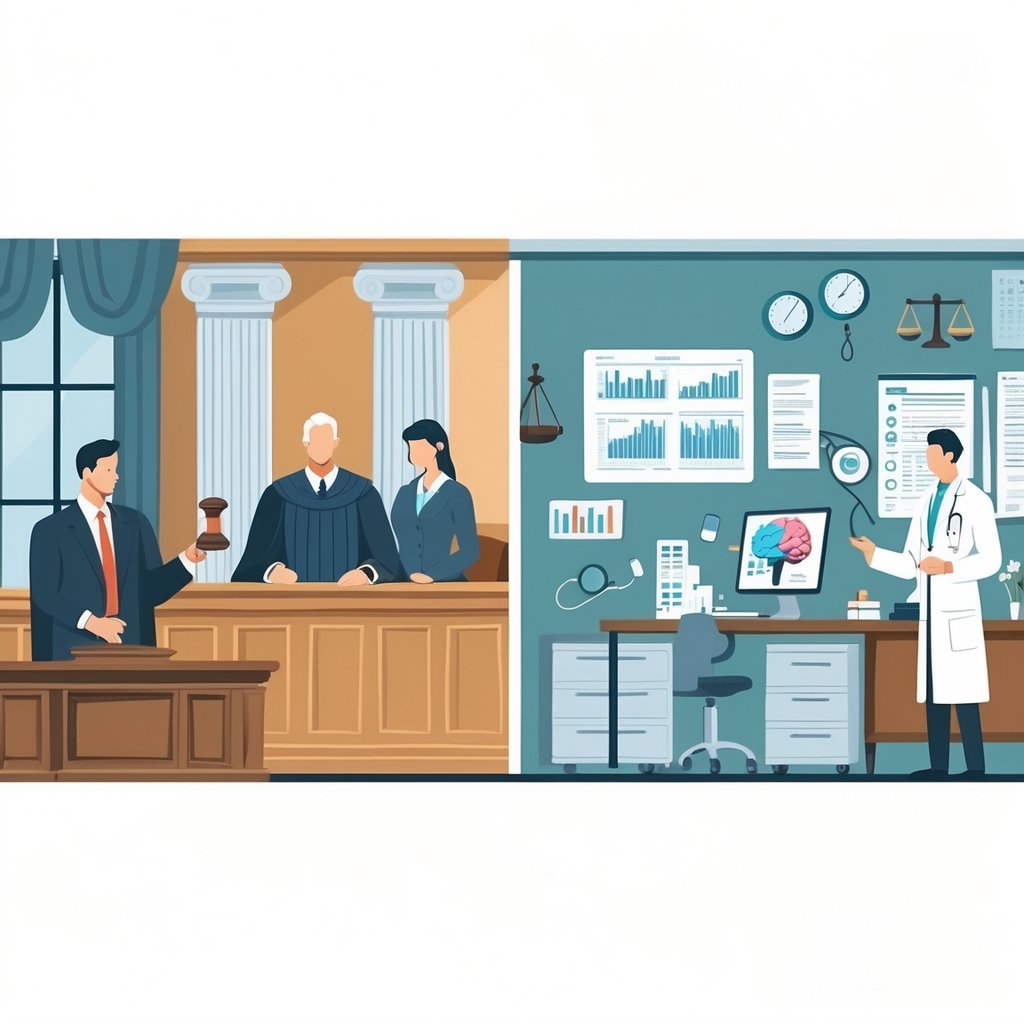
Legal insanity asks if a person could understand their actions and distinguish right from wrong during a crime. Medical insanity covers a broader range of mental health conditions that might need treatment but don’t always affect legal responsibility.
Legal Insanity Explained
Legal insanity serves as a defense in criminal cases when you can’t understand your actions or their consequences. The legal system requires specific criteria for this defense.
You must show that, at the time of the offense, your mental state stopped you from knowing right from wrong. This goes beyond just having a mental illness.
The accused must present evidence through psychiatric evaluations and witness testimony about their behavior before, during, and after the incident.
Key Requirements for Legal Insanity:
- Mental disorder at time of offense
- Inability to understand nature of actions
- Cannot distinguish right from wrong
- Loss of reasoning capacity
Courts don’t accept medical diagnoses as proof of legal insanity. Legal insanity requires proof of cognitive impairment specifically at the time the crime happened.
The M’Naughten Rule forms the foundation for most jurisdictions. This test asks if you knew your actions were wrong when you did them.
Medical Insanity Defined
Medical insanity includes a range of mental health conditions that healthcare professionals diagnose and treat. Medical insanity refers to mental illness needing clinical attention, but it doesn’t automatically affect your legal responsibility.
Doctors may diagnose depression, anxiety, bipolar disorder, or schizophrenia. These represent medical insanity when they disrupt your thinking or emotions.
Common Types of Medical Insanity:
- Depression and mood disorders
- Anxiety disorders
- Psychotic disorders
- Personality disorders
- Substance abuse disorders
You can get a medical insanity diagnosis and still make decisions in daily life. Many people with mental illness live independently and make informed choices with the right treatment.
Medical professionals focus on mental health and well-being. They aim to diagnose, treat, and manage your mental disorder through therapy, medication, or other interventions.
The diagnosis process relies on clinical criteria and professional judgment. Healthcare providers evaluate your symptoms and condition.
Having a mental disease doesn’t mean you’re legally insane. Every person suffering from a mental disease is not automatically exempted from criminal liability.
Core Differences Between Legal and Medical Insanity
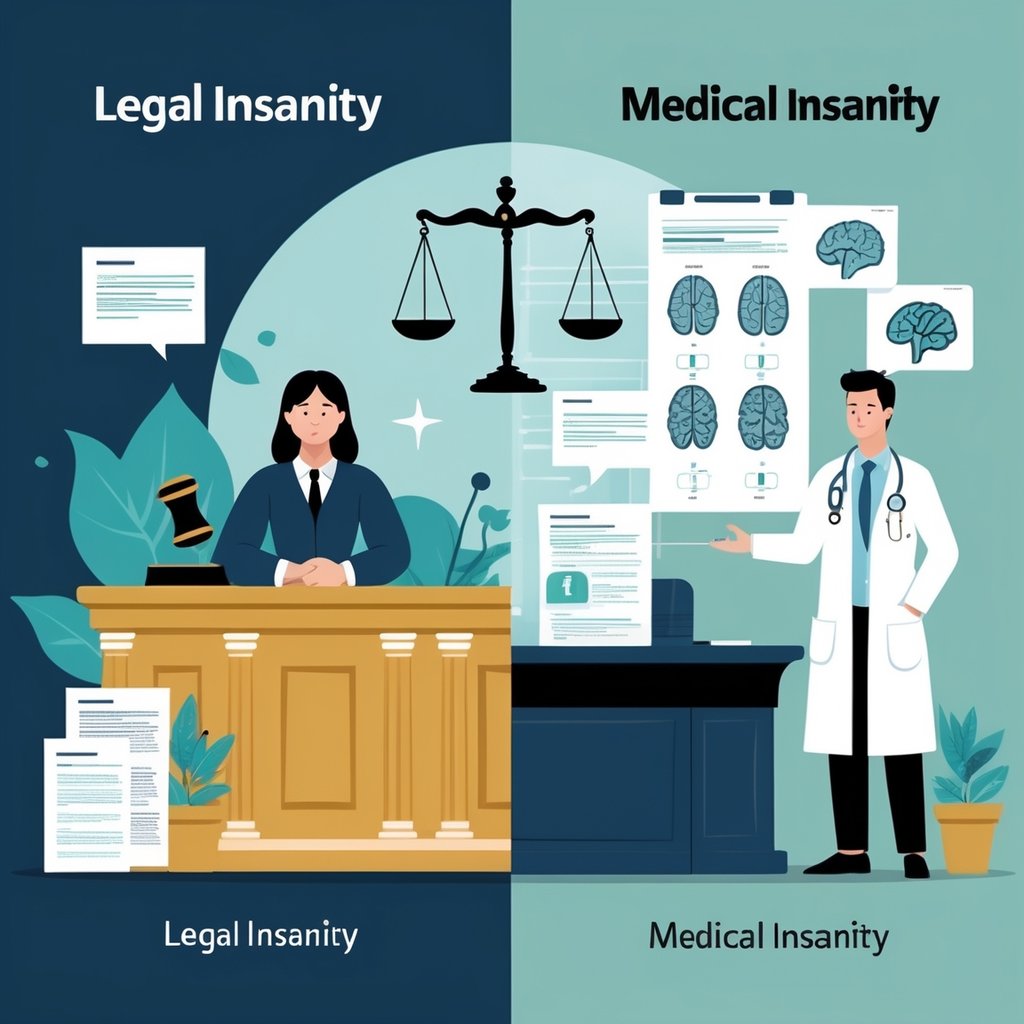
Legal insanity focuses on whether you could understand right from wrong during a crime. Medical insanity centers on clinical diagnosis and treatment of mental disorders.
The standards, professionals involved, and consequences differ a lot between these two ideas.
Criteria and Standards of Assessment
Medical insanity uses clinical standards to diagnose mental disorders like depression or schizophrenia. Psychiatrists and other mental health professionals look at your symptoms, behavior, and medical history.
They focus on understanding your condition and making treatment plans. Medical insanity covers a spectrum of mental health disorders that affect how you think and feel.
Legal insanity requires much stricter standards. You must show your mental state stopped you from understanding your actions or knowing they were wrong.
Legal insanity means you were incapable of knowing the nature of the act or that what you were doing was wrong. The timing is crucial—your mental state must have existed when the crime happened.
Role of Mental Health Professionals
In medical settings, psychiatrists and psychologists diagnose and treat your mental health conditions. They work to help you manage symptoms and improve your life.
The primary goal of medical insanity is to identify and manage mental illnesses. These professionals use established diagnostic criteria and treatment protocols.
In legal cases, mental health experts serve as witnesses who evaluate your mental state. They determine if you meet the specific legal standards for insanity defenses.
Their role shifts from treatment to assessment for the court. The legal system asks them to answer narrow questions about your ability to understand right from wrong.
Impact on Criminal Responsibility
A medical diagnosis of mental illness doesn’t automatically excuse you from criminal responsibility. Every person who is mentally ill is not automatically exempted from criminal responsibility.
You can receive psychiatric treatment and still be held accountable for crimes. Many people with mental disorders understand their actions and face normal legal consequences.
Legal insanity, if proven, leads to different outcomes. You might be found not guilty by reason of insanity and sent to a mental health facility instead of prison.
Legal insanity is concerned with determining culpability or criminal responsibility in the context of the justice system. The focus is on whether you should be held criminally responsible for your actions.
Legal Insanity in Criminal Law
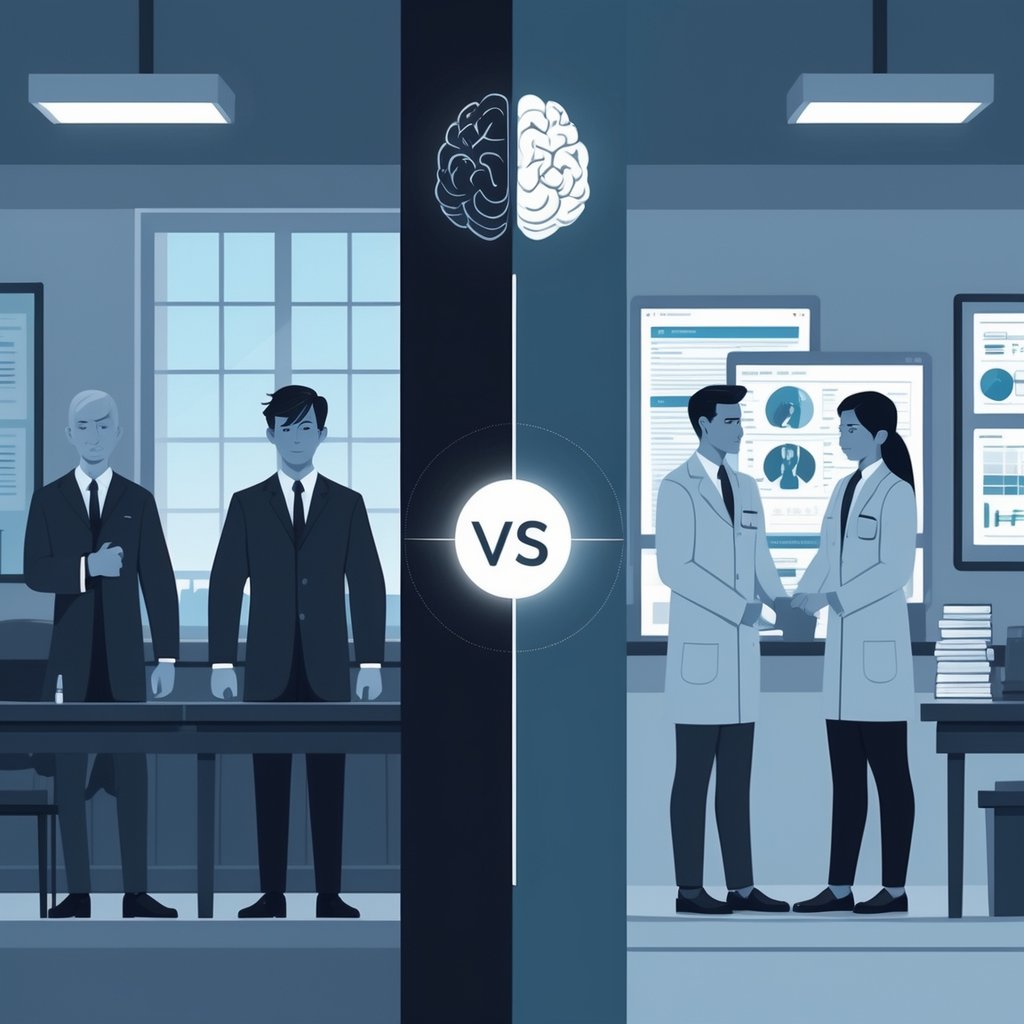
Legal insanity differs from medical insanity and centers on your mental state when you committed a crime. Courts use specific legal tests to decide if you can be held responsible for criminal acts.
Insanity Defense in Court
The insanity defense lets you avoid criminal responsibility if you had severe mental illness during the crime. This defense exists to make distinctions for people with mental disabilities.
You must show you couldn’t understand right from wrong when you committed the act. The burden of proof rests on you as the accused to prove your insanity.
Key Requirements:
- Mental illness at time of crime
- Loss of reasoning power
- Inability to understand nature of actions
- Cannot distinguish right from wrong
Legal insanity implies you lacked cognitive understanding when you committed the criminal act.
Tests and Legal Standards
Courts use different legal tests to measure your mental state during the crime. The most common test comes from old English law called the M’Naghten Rule.
M’Naghten Test:
You must show you did not know:
- The nature of your act, OR
- That your act was wrong
Some states use broader tests that look at whether you could control your behavior. Pennsylvania law distinguishes mental illness from legal insanity in criminal cases.
The American Law Institute created another standard. This test asks if you could appreciate your conduct was wrong or conform to legal requirements.
Not Guilty by Reason of Insanity Verdict
If you win an insanity defense, you get a “not guilty by reason of insanity” verdict. This doesn’t mean you go free right away.
The court usually sends you to a mental health facility for treatment. You stay there until doctors say you aren’t dangerous to yourself or others.
What Happens Next:
- Commitment to psychiatric hospital
- Regular mental health evaluations
- Possible release with conditions
- Continued court supervision
The legal doctrine provides an excuse from criminal responsibility when you lack capacity for responsible action. This protects people who truly couldn’t control their actions due to severe mental illness.
The length of your commitment often exceeds what a prison sentence would have been. Courts care more about public safety than quick release.
Medical Insanity and Psychiatric Evaluation
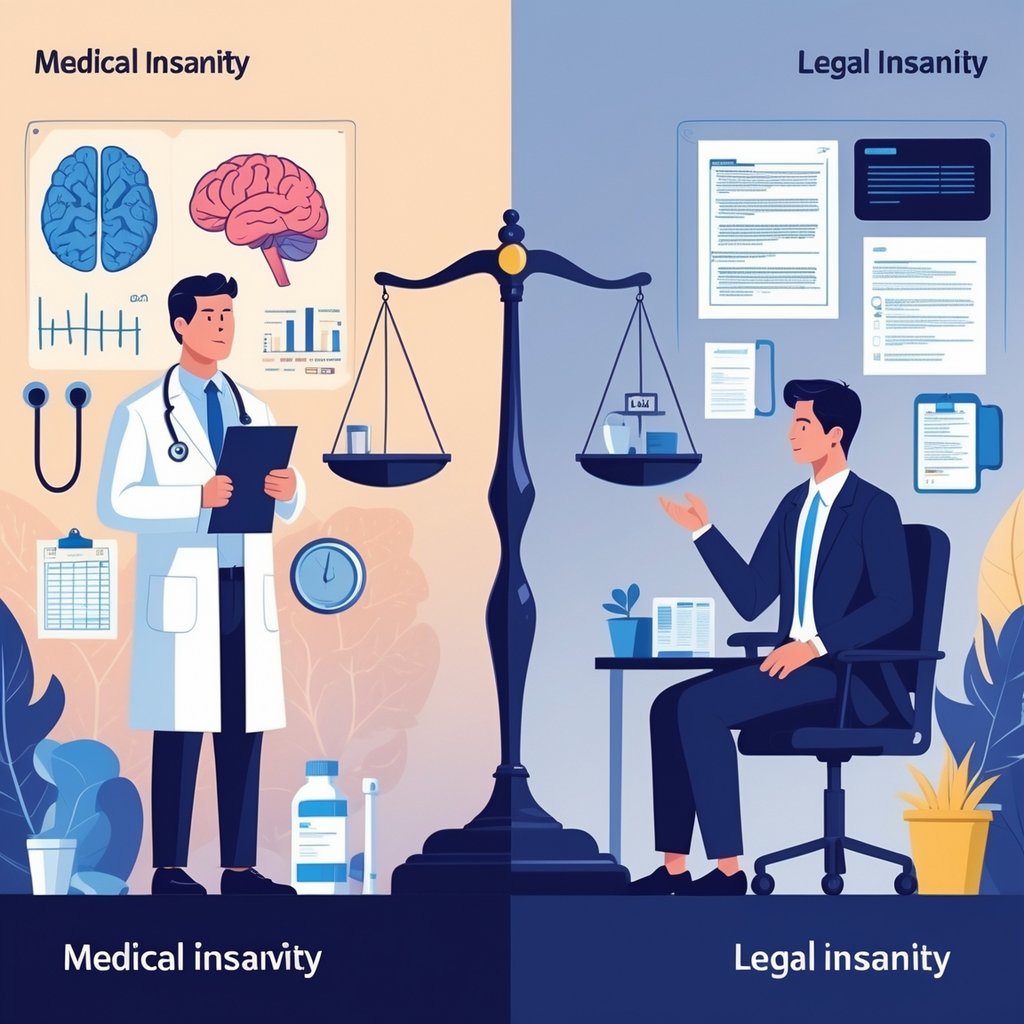
Medical insanity focuses on the clinical diagnosis and treatment of mental disorders. Psychiatrists use specific criteria to identify mental illness and create treatment plans for patients.
Diagnosis and Classification
Psychiatrists evaluate your mental health using standardized diagnostic tools. They look for symptoms that match known mental disorders.
The process starts with a detailed interview about your symptoms and history. Your doctor will ask when problems began and how they affect your daily life.
Mental health professionals use the DSM-5 (Diagnostic and Statistical Manual) to classify mental disorders. This book lists specific criteria for each condition.
Common categories include:
- Mood disorders (depression, bipolar disorder)
- Anxiety disorders (panic disorder, ADHD)
- Psychotic disorders (schizophrenia, delusional disorder)
- Personality disorders (borderline, narcissistic)
Your psychiatrist might order blood work or brain scans. These tests help rule out medical causes for your symptoms.
The diagnosis tells you what type of mental illness you have. This stands apart from legal insanity, which only cares about whether you knew right from wrong during a crime.
Treatment and Management
Treatment for mental illness depends on your diagnosis and what you need. Psychiatrists put together personalized plans to help manage symptoms.
Medication is often the first step. Some common types include:
- Antidepressants for mood disorders
- Antipsychotics for psychotic symptoms
Mood stabilizers help with bipolar disorder. Anti-anxiety medications target panic and worry.
Therapy works alongside medication to teach coping skills. Cognitive behavioral therapy aims to shift negative thought patterns.
You’ll have regular follow-up appointments to track progress. Your psychiatrist might adjust medications or add new treatments as needed.
Sometimes, patients need intensive options like hospitalization. This happens if symptoms become severe or dangerous.
Medical treatment focuses on healing and recovery. Legal insanity involves criminal liability, but here the goal is to help you function better in daily life.
Procedural and Practical Consequences
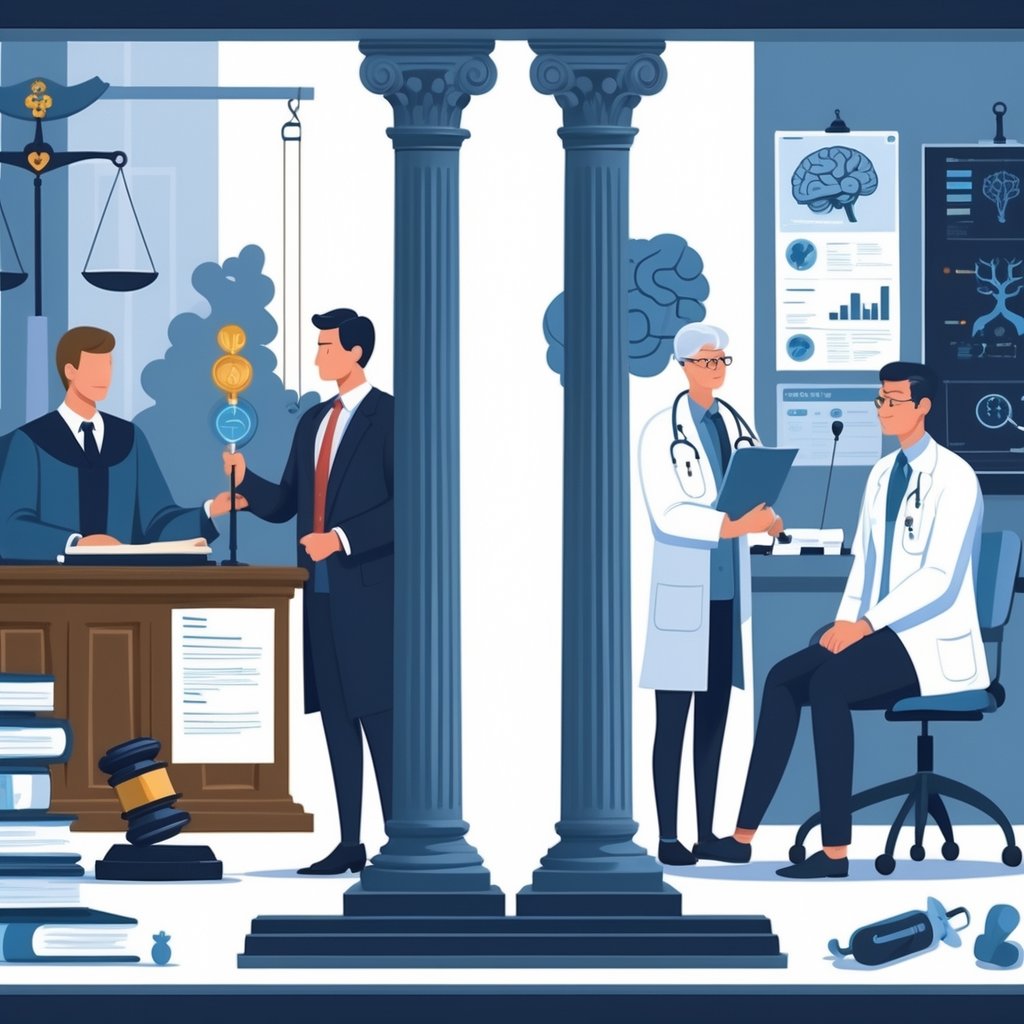
The legal system handles insanity cases through procedures that look very different from medical treatment. Legal insanity creates unique burden requirements and leads to outcomes that don’t always match up with medical insanity diagnoses.
Burden of Proof and Evidentiary Requirements
Raising an insanity defense means you have to show your mental state met legal standards at the time of the offense. The burden of proof sits with the accused to prove insanity, but it’s not as heavy as the prosecution’s job.
A medical diagnosis alone won’t cut it. Medical insanity alone does not provide immunity from criminal liability.
Key Evidence Requirements:
- Expert psychiatric testimony
- Medical records from the relevant time
- Witness accounts of your behavior
- Documentation of your mental state during the offense
The court wants proof that your mental condition kept you from understanding right from wrong. Medical records showing ongoing treatment can help, but they don’t guarantee success.
Outcomes and Dispositions
Case outcomes depend on which type of insanity the court recognizes. If the court finds you not guilty by reason of insanity, you avoid prison and face civil commitment to a mental health facility.
The defendant will complete his sentence even if cured, while someone found not guilty by reason of insanity gets released when considered recovered.
Possible Outcomes:
- Guilty verdict: Prison sentence with mental health treatment
- Not guilty by reason of insanity: Psychiatric hospitalization until considered safe
- Competency issues: Treatment until fit for trial
Legal consequences differ significantly based on the verdict. Prison focuses on punishment and rehabilitation.
Mental health facilities focus on treatment and public safety. Release from a facility depends on clinical improvement.
Prison release comes after finishing your sentence, regardless of mental health status.
Societal and Ethical Considerations
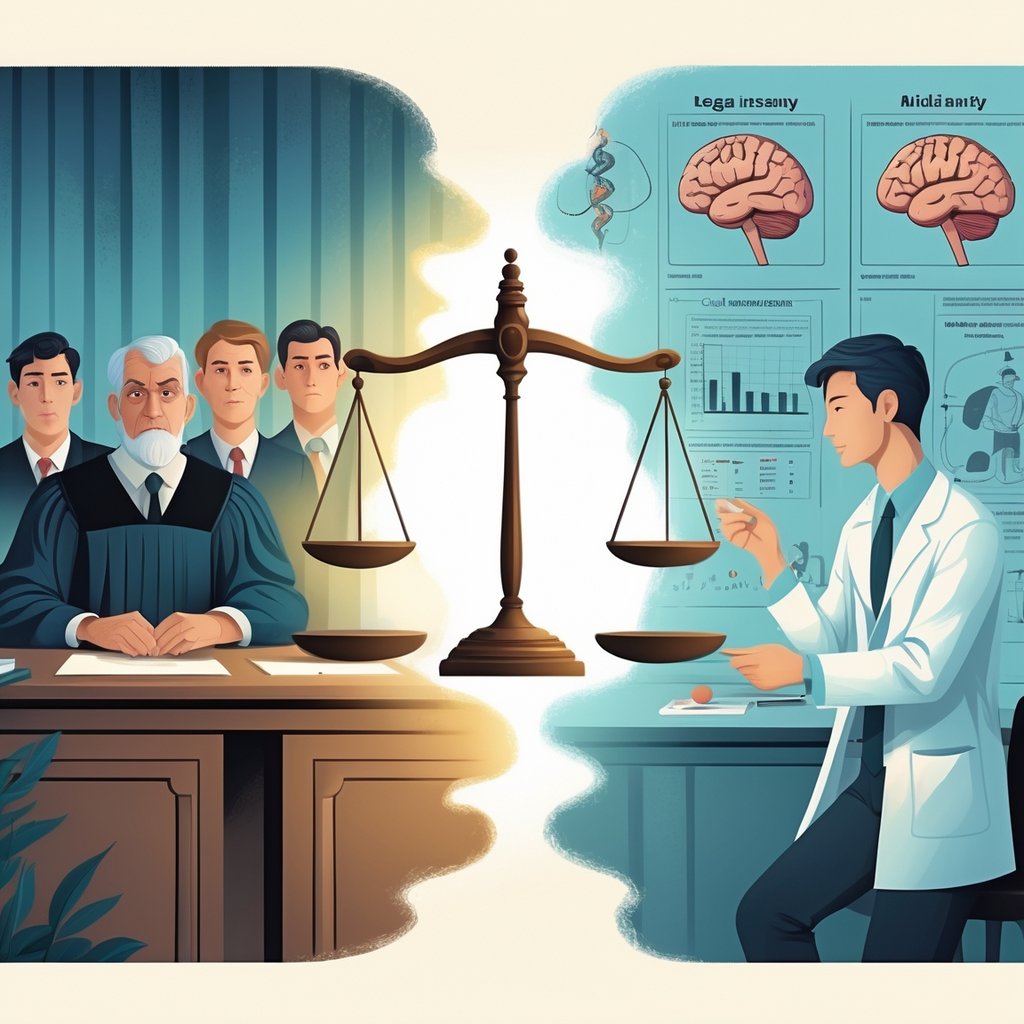
The overlap of mental illness and criminal responsibility brings up challenges that reach beyond courtrooms. Public attitudes and safety concerns shape how society sees defendants who use insanity defenses.
Stigma and Public Perceptions
Insanity defenses in the news spark widespread misconceptions about mental illness. Media portrayals often clash with both actual medical definitions and legal definitions of insanity.
Common public myths include:
- People fake mental illness to dodge prison
- Insanity defenses happen all the time
- Defendants “get away with” crimes
These beliefs create real stigma. The truth is, insanity defenses succeed in less than 1% of cases.
Your views matter, especially if you ever serve on a jury. Biases can shape whether defendants get fair treatment under the law.
Public fear often grows from sensational cases in the media. Most people with mental illness never commit crimes, but you rarely see those stories.
Impact on Defendants and Public Safety
Balancing public safety and fair treatment of defendants with mental illness isn’t easy. The justice system faces ethical dilemmas.
Defendants who succeed with insanity defenses usually go to secure psychiatric facilities, not back into society. These commitments can last longer than prison sentences.
Key considerations include:
- Treatment versus punishment
- How well risk assessments work
- Long-term public safety
Criminal responsibility depends on your mental state at the time of the offense. Courts have to weigh if treatment or incarceration is better for society.
Defendants with serious mental illness who don’t meet legal insanity standards often struggle to get proper care in prison.
Frequently Asked Questions
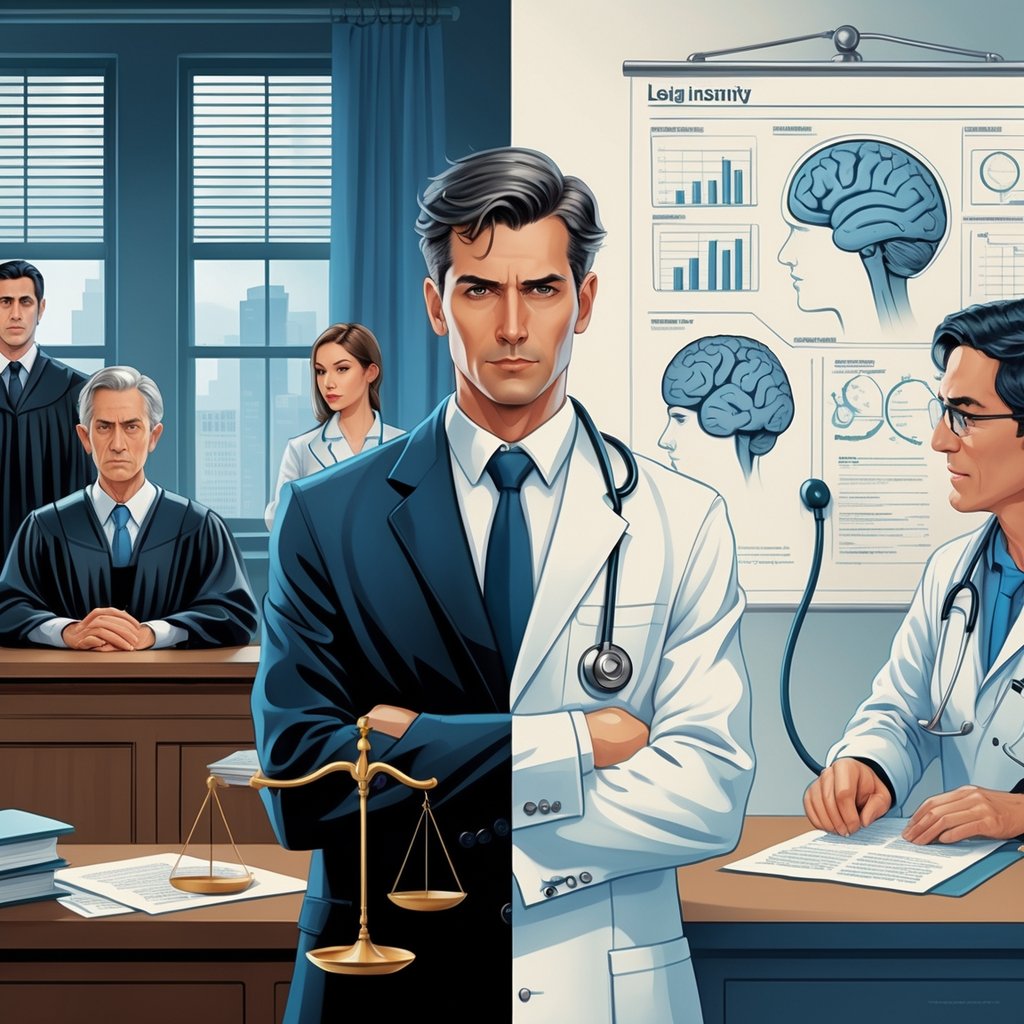
Legal insanity means proving you couldn’t understand right from wrong during a crime. Medical insanity is a clinical diagnosis that might not affect criminal responsibility.
What constitutes legal insanity in criminal law?
Legal insanity means you couldn’t understand the nature of your actions or know they were wrong when you committed a crime. This legal determination focuses on criminal responsibility instead of medical diagnosis.
You have to show you lacked the mental capacity to understand your conduct at the time. The court checks if your mental state kept you from telling right from wrong.
Legal insanity serves as a defense that can exempt you from criminal liability. You carry the burden of proving mental incapacity during the alleged crime.
What are the criteria for determining medical insanity?
Medical insanity is a clinical diagnosis from healthcare professionals. Mental health conditions like anxiety and depression are included.
Doctors look at symptoms, behavior, and psychological functioning. The diagnosis focuses on your mental health and treatment needs.
Medical insanity doesn’t always impact your decision-making. You might function well with treatment and medication.
How do the requirements for an insanity plea differ from clinical diagnoses of insanity?
An insanity plea means you must prove you couldn’t understand your criminal actions were wrong. Clinical diagnosis aims to identify and treat mental illness.
You need to show your mental state at the time of the crime for legal purposes. Medical diagnosis looks at your overall psychological condition.
The burden of proof is much higher in court. Legal insanity requires convincing evidence, while medical diagnosis relies on clinical assessment.
What are the different types of insanity defenses recognized in court?
The M’Naughten Rule checks if you knew right from wrong during the offense. This standard started in 19th-century England and is still used.
Some places use the irresistible impulse test. It asks if you could control your actions even if you knew they were wrong.
The Durham Rule considers if a mental disease or defect caused your criminal act. Modern courts often mix these standards when judging insanity defenses.
What are the challenges associated with the insanity defense in legal proceedings?
You have to prove legal insanity, not just medical insanity. A mental illness diagnosis alone doesn’t guarantee criminal immunity.
Getting enough evidence about your mental state during the crime can be tough. You need witness testimony, medical records, and expert evaluations to build your case.
The defense has to show your conduct before, during, and after the offense. Courts look closely at whether your mental condition truly prevented you from understanding wrongdoing.
What are examples of cases where the insanity defense was successfully used?
R v. Arnold in 1724 stands out as the first insanity case on record. Edward Arnold tried to kill Lord Onslow while struggling with a mental disorder.
The Surendra Mishra vs. State of Jharkhand case clarified modern insanity defense standards. The Supreme Court pointed out that mental illness alone doesn’t automatically excuse someone from criminal responsibility.
Successful cases usually center on severe mental conditions like schizophrenia or bipolar disorder. Defendants in these cases often couldn’t grasp that their actions were criminal when the offense happened.






